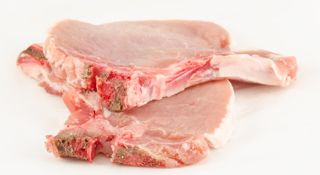|
A lesser-known foodborne pathogen, Yersinia enterocolitica can cause fever, abdominal pain and diarrhea, lasting one to three weeks, according to the Centers for Disease Control and Prevention. There is approximately one confirmed infection per 100,000 people reported each year. Consumer Reports tested 198 samples and found that while the vast majority were positive for Yersinia enterocolitica, only 3 to 7 percent were positive for more the more common foodborne pathogens Salmonella, Staphylococcus aureus or Listeria monocytogenes. According to the report, several of the isolates found were resistant to one or more antibiotics: 6 of the 8 Salmonella samples, 13 of the 14 Staphylococcus samples and 121 of the 132 yersinia samples. The study also found MRSA on one sample. The group points to the widespread use of antibiotics in agriculture as a key contributor to the resistance problem. The report cites Robert Lawrence, a doctor who serves as director of the Center for a Liveable Future at the Johns Hopkins Bloomberg School of Public Health: "When you give low-dose antibiotics for growth promotion of for prophylaxis of infection, you end up killing off the susceptible bacteria, whether they're E. coli, Salmonella, Campylobacter or other bacteria. And you continue to select for those bacteria that, through spontaneous mutations or transfer of genes from other resistant bacteria, allow them to be resistant to antibiotics." There are a number of precautions consumers can take to avoid exposure to Yersinia enterocolitica. CDC recommends avoiding raw or undercooked pork, consuming only pasteurized dairy products, and washing hands when preparing food, after contact with animals and after handling raw meat. Raw chitterlings, or pig intestines, are seen as a particular risk. CDC recommends cleaning hands and fingernails thoroughly with soap and water before touching infants or their toys, bottles or pacifiers after handling chitterlings. The study also tested 240 additional samples of pork and found that 20 percent contained traces of ractopamine, a controversial beta-agonist drug widely used in pork production to boost feed efficiency and leanness. Each sample that tested positive had concentrations at less than 5 parts per billion (ppb), which is below the U.S. Food and Drug Administration's safety standard for pork muscle meat (50 ppb) and the recently adopted Codex Alimentarius Commission standard (10 ppb). The drug, marketed to pork producers as Paylean, has been at the heart of recent trade controversies with the European Union, Taiwan and China, which each ban the drug and ask that U.S. meat imports are from pigs not fed ractopamine. Citing incomplete safety data, Consumers Union, the policy and advocacy arm of Consumer Reports, has pressed for a ban on the drug. A report published by nbcnews.com last year found that ractopamine had sparked more adverse drug experience reports for pigs than any other drug. According to FDA documents, the adverse reports complained that pigs suffered hyperactivity, trembling, broken limbs, inability to walk and death. FDA says such data do not establish that the drug caused the health problems, but the agency asked the drugmaker to add a warning label to the product in 2002. © Food Safety NewsMore Headlines from Food Politics |
11.27.2012
Consumer Reports Finds Most Pork Contaminated With Yersinia
Subscribe to:
Post Comments (Atom)

No comments:
Post a Comment